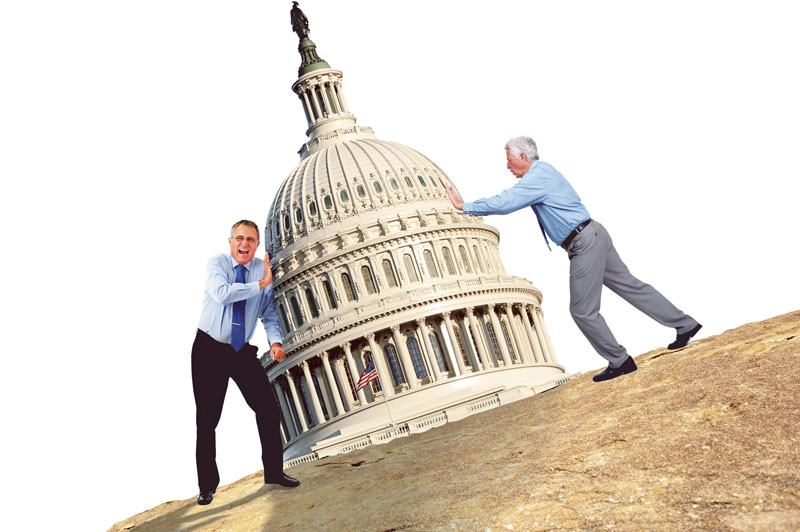After 12 years serving Maine in Congress, I find the last four have been a gift, an opportunity to try to make sense of a political system in disarray, a gridlocked Congress and polarized public. In my book, “Dangerous Convictions,” I use examples from my experience to highlight the clash of incompatible worldviews that below the surface shapes Republican and Democratic positions on a wide range of different issues.
Congress today is deeply divided because, to each side, the opinions of the other make no sense and therefore, each concludes, cannot be honestly held. Gridlock has been driven primarily by emotionally laden attitudes and less by congressional gerrymandering or either party’s abuse of Senate and House rules.
When Republicans argued that “tax cuts pay for themselves,” “we’ll be welcomed as liberators” and “climate science isn’t proven,” we Democrats thought they could not believe what they were saying. When we argued against the Bush “tax cuts for the rich,” they thought we were pandering, because for Republicans, the wealthy were the vital force in the American economy, the “job creators” on whom the rest of the population depended.
It’s hard to understand our dysfunctional Congress because the media usually ignores the widening, hardening conflict in worldviews between the two parties. Democrats still see government as a vehicle to increase opportunity for low- and middle-class Americans and to cope with public challenges beyond the capacity of the private and nonprofit sectors. For them, evidence about what policies work still matters.
Republicans increasingly view our government as an institution that infringes on personal liberty, fosters “dependency” among the population and is generally incompetent. Those beliefs lead straight to a simpler goal: much lower taxes and spending. Evidence about specific policies and programs matters less to conservatives because their object is to reduce government’s role across the board.
The media’s concentration on lack of civility misses the point. I traveled with Republicans to Iraq and Afghanistan and enjoyed their company. We worked out together in the House gym. We could cooperate on some issues that didn’t trigger gridlock on taxes and spending. But more weekends together in Washington would not have changed our views about the most consequential public issues.
It used to be so different. President Nixon signed the Clean Water Act, the Clean Air Act, the Endangered Species Act and the legislation that created the Environmental Protection Agency. After his 1981 tax cut, President Reagan, alarmed at the increasing deficits that followed, raised taxes 11 times before the end of his second term.
How can members of Congress be so hopelessly divided on the tax rates paid by the wealthiest Americans? Why was Secretary Rumsfeld determined to pull out of Iraq within months in order to avoid creating a “culture of dependency” among Iraqis? Why was there never a Republican proposal to “replace” Obamacare, and why do so many Republicans deny what is, in fact, an overwhelming consensus among climate scientists about the nature, sources and consequences of climate change?
Our political debate is sometimes described as being about “the role of government.” That’s too dry, too much of a green eye-shade description, to explain the intensity of feelings on both sides. I believe conservatives are alarmed that in an increasingly complex and interconnected world, government by its very nature is a threat to America’s quintessential virtue: self-reliance. Democrats see that attack on government as undermining our characteristic practice of working together to address common problems.
At this deeper level, all domestic issues blend into one: a fierce conflict between our most important values, to wit, individualism and community. What should we do together and what should we do on our own? In a simpler time we valued both, even in our politics. Outside of politics, we still do. We tell our kids they can do anything they want if they work hard; we also coach them that there’s no “I” in “team.” The shelves of our bookstores are lined with books advising business leaders how to build a team committed to a shared vision. Our religious and social organizations almost always have a mission to serve the common good.
The path to more pragmatic politics may be harder for Republicans because of their current aversion to government itself, but both parties have to recognize that the other’s views are grounded in fundamental American values.
Until the 2010 election, and their 2012 presidential caucus, Republicans in Maine had largely resisted the libertarian economic thinking that now dominates the national party. One reason, I believe, has been the refusal by then-Sen. Olympia Snowe and Sen. Susan Collins to adopt the rhetoric or the mindset of many of their colleagues from the South and West.
The polarization and gridlock of the present moment are deeply discouraging. But I hope and believe that we will move past fruitless debates about the size of government and deal pragmatically with the global threats to our economic prosperity and the health of the planet we inhabit.
– Adapted from Tom Allen’s book, “Dangerous Convictions: What’s Really Wrong with the U.S. Congress,” for the Maine Sunday Telegram.
Send questions/comments to the editors.





Success. Please wait for the page to reload. If the page does not reload within 5 seconds, please refresh the page.
Enter your email and password to access comments.
Hi, to comment on stories you must . This profile is in addition to your subscription and website login.
Already have a commenting profile? .
Invalid username/password.
Please check your email to confirm and complete your registration.
Only subscribers are eligible to post comments. Please subscribe or login first for digital access. Here’s why.
Use the form below to reset your password. When you've submitted your account email, we will send an email with a reset code.